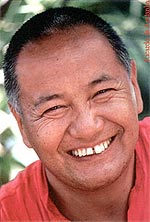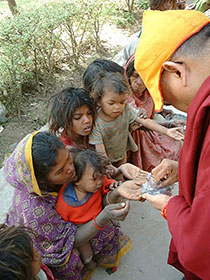Universal Education for Compassion and Wisdom

Lama Thubten Yeshe
In Buddhism we have an incredible arrangement, universal education from the beginning at birth up until death, as an old man. I feel these things could be put into a universal language. Give up religion, give up Buddhism. Go beyond Buddhism. Put the essential aspect of the philosophy into scientific language. This is my aim.
—Lama Thubten Yeshe, January 1983
Universal Education for Compassion and Wisdom is one of FPMT’s Five Pillars of Service. The UECW pillar sits with the other four Pillars of Service: Dharma, Social/Community Service, Interfaith Activities, and Revenue-generating Activities. The Foundation for Developing Compassion and Wisdom (FDCW) offers many educational and training programs based on the Universal Education model inspired by FPMT Founder Lama Thubten Yeshe. FDCW is the UECW Hub for the FPMT organization.
Foundation for Developing Compassion and Wisdom (FDCW)
The Foundation for Developing Compassion and Wisdom was established in 2005 to help create a more peaceful, compassionate and sustainable world. FDCW provides educational programs and training that help transform minds and make people happier. These programs are based on Universal Education for Compassion and Wisdom (UECW) which is a system of inner learning allowing people to break through their self-limiting beliefs, step outside their destructive patterns, build better relationships, and ultimately develop their own innate capacity to be wise and compassionate.
The key to a happier and more successful world is the growth of compassion. We do not need to become religious, but to each develop our good human qualities
—His Holiness the Dalai Lama (Honorary Patron of FDCW)
The creation of UECW was inspired by Lama Yeshe’s vision for “a new kind of education for the world,” first developed in the early 1980s. His Holiness the Dalai Lama, the Honorary Patron of FDCW, is one of the world’s leading advocates for the promotion of positive human values and secular ethics in education.
FDCW creates and disseminates its programs widely throughout the FPMT network, using various global marketing channels.
FDCW’s programs directly impact people in the sectors of education, healthcare, corporate, homelessness, and hospices. Our Annual Review demonstrates this in more detail with Case Studies across these sectors.
The 16 Guidelines for a Happy Life
The main program that FDCW offers is The 16 Guidelines for a Happy Life. The 16 Guidelines are a direct and practical tool for making life better. They provide a simple yet robust framework examining the way we think, speak and act.
The latest research into neuroscience suggests that each of us has the potential to continue developing and transforming our minds, from birth right up until death. We can literally re-wire our brains for happiness.
The program is inspired by King Tsongsen Gampo who invited philosophical and spiritual teachers from India into Tibet during the 7th century CE. He began the process of transforming a war-like nation into a civilization noted for its peace and serenity. The Guidelines are a contemporary presentation of ancient wisdom.
The 16 Guidelines are presented in four wisdom themes. The framework explores our mind more deeply, cultivates the practice of values and a compassionate attitude resulting in a happier, more meaningful life.
- How we think – the way we use our mind determines the way we live
- How we act – every skillful action makes a better world
- How we relate – to take care of others is to take care of ourselves
- How we find meaning–if everything is changing, many things are possible
The powerful simplicity of 16 Guidelines is unnerving in the beginning. I very quickly put what I had learned that weekend into practice and found that it was extremely versatile. — Gillian Watt, 16G Facilitator, Scotland
Sharing the 16 Guidelines in your Community
There are over 100 FDCW Facilitators around the world who provide 16 Guidelines Level 1 and 16 Guidelines Level 2 courses. Scheduled courses are listed on the FDCW Events calendar. If you wish to invite a Facilitator to deliver a 16 Guidelines course either online or in person, please contact them directly or contact the FDCW team.
For details about the different 16 Guidelines courses available and also to watch a simple 5 minute video introducing each Guideline, please see The 16 Guidelines for Happy Life. You can also explore the 16 Guidelines yourself in a 30 day self-study course called Building Inner Strength that includes audio presentations, guided meditations and journaling prompts
It is not necessary to become an accredited 16G facilitator to be able to share the Guidelines in your community. FDCW offers a range of free resources to explore the Guidelines. This includes downloadable guides for group discussions on core values and also for introducing values and mindfulness to children. There are 100+ videos available on topics like Compassion, Love, Presence and Embodiment, Reclaiming Joy, Breathing in Equanimity, Kindful Communication, Self-compassion, Getting a Grip on Mind and much more. There are 30 audio guided meditations available on topics like compassion, universal love, courage, perceptions, joy, forgiveness, working with emotions.
Some FPMT centers are offering weekly discussion groups on the Guidelines using a new FDCW resource called Conversations That Matter. The purpose of the new resource is to inspire conversations about values. Here is what they shared:-
I have been leading Conversations that Matter (CTM) over the past three weeks. It has been going really well, we’ve had a tremendous outcome as our attendance has doubled over the past few weeks for the first consecutive time since we reopened post pandemic, amazing news!
People are returning both in person and online for these hour-long sessions and they have a lot to share, it’s nice to be able to provide them the space they need to share these things and we are all learning from each other, its beautiful! We are very grateful for this opportunity and we plan on keeping this going for the next six months! – Nicole Zito, Director, Thubten Kunga Center, Deerfield Beach, Florida
I decided to call the weekly sessions Tools for Happiness. We had between 6 to 12 people attending sessions – with a regular core group of around 6 to 8 at most sessions. We had 16 sessions exploring one value each week. I slightly adapted the content and structure of the sessions suggested in the 16 Guidelines material. For example, instead of using the same mindfulness meditation every week, I researched and chose appropriate meditations to settle the group in at the start of each session.
What I learned from running the group was too much to list, however here’s a few things…I learned how to listen better. I learned how to be more patient and how to pull the group back to the subject in a gentle way. I learned that everyone has something to contribute and even the quietest of them will speak up when they feel safe and supported.
I think what people got out of the program was discovering that there are many views even on just one subject. They also all felt they had some tools to work with around each guideline/value. – Annette French, Assistant SPC, Buddha House, Adelaide
If you would like to explore using this resource in your community, it is available here:- Download Conversations That Matter
Please do share your feedback on using this resource with the FDCW team.








